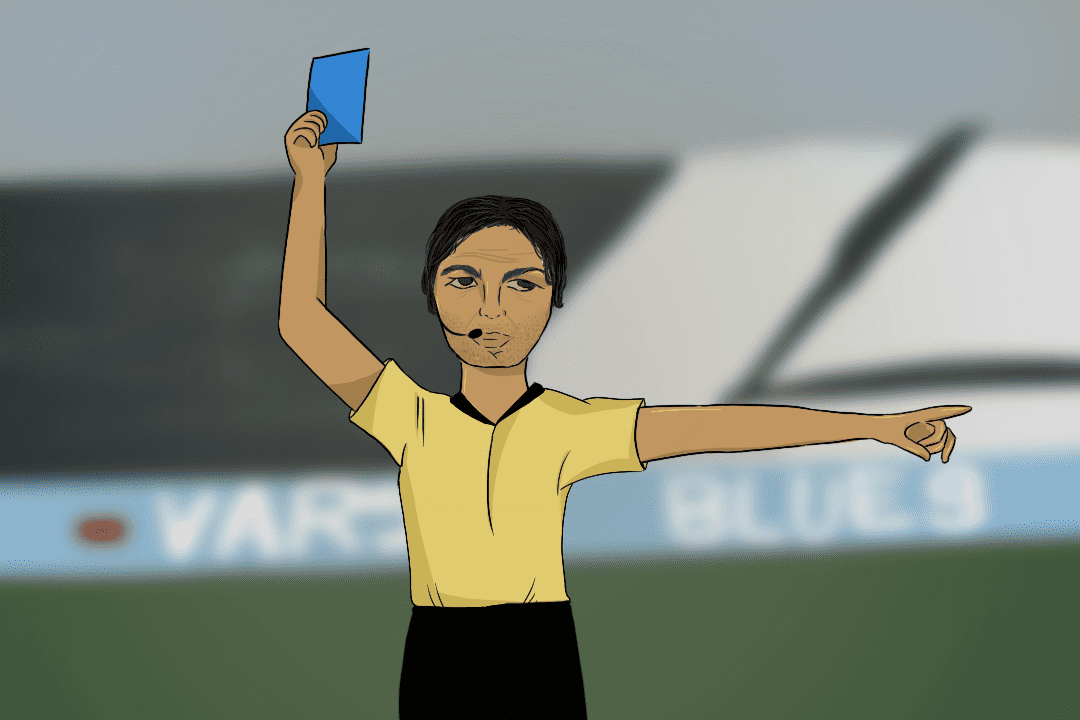At the beginning of February, the International Football Association Board (IFAB) announced plans for introducing a blue card into football. The blue card would allow referees to send players off the pitch for 10 minutes for dissent or cynical fouls, mirroring the usage of ‘sin bins’ or penalty boxes in other sports. Receiving two blue cards would mean a player is sent off for the rest of the game. Goalkeepers would not be exempt.
The blue cards were recommended by lawmakers for higher levels of the sport after successful trials at youth levels in the UK. However, FIFA has called the introduction of these cards at a senior level “premature” and wants trials to continue at amateur levels first.
So, for the moment the footballing world still awaits the implementation of what I believe is the most radical change to footballing punishments ever. But is it a necessary change?
There has been much outcry against the implementation of the blue card from managers and players, with Tottenham Hotspur’s manager Ange Postecoglou stating in a pre-game press conference this February that it will “destroy” the game. I am more than inclined to agree with him.
I believe that the usage of these cards will create unnecessary stoppages in play where the referee must spend time deliberating whether a foul was ‘cynical’ enough to be deemed a blue card and not a yellow card. It will also lead to more time being spent consulting the video assistant referee (VAR), which will further drain momentum from the game.
Much of the entertainment value of modern football is based around speed, and the usage of blue cards would slow the game down, mirroring the frequent stoppages in the NBA in which virtually any contact constitutes a foul.
Furthermore, officials have already been told to try and stop players from wasting time during the game, adding extra minutes at the end of the game to make up for players’ attempts at delays. These cards would only further increase the length of games thanks to delays in play as referees make their decisions.
Additionally, this puts more strain on players as their packed match calendars are already leading to more injuries. A player who is coming back on after receiving a blue card has an increased risk of injury by going into a fast-paced game after their body has relaxed on the sideline.
Another key issue is the fact that officials are receiving more power despite having already proven to me that they cannot handle what they already have. The Premier League recently stated that the VAR had made 20 errors this season, showing that it isn’t up to standard in its present state and the officials using it cannot be trusted to make the correct decisions. Thus, if officials cannot see that Luis Díaz was not offside when he scored his goal in Liverpool’s game against Tottenham back in September, how can we trust referees to know how to effectively use a blue card?
While there is a serious problem with players crowding referees when they disagree with a decision, this does not mean the referee needs to send all of them off the pitch for 10 minutes. Furthermore, it is unclear what dissent and cynical fouls mean, as both are highly subjective terms. There is a fine line between a player verbally abusing a referee and getting caught in the heat of the moment. I do not believe referees can be trusted to walk that line effectively.
Ultimately, I believe the introduction of these new cards is a massive overreaction to dissent in football. If the members of the IFAB want to see changes, they need to focus on improving the quality of on-field decisions and spend time educating players on why shouting at the referee gets you nowhere. This could be helped by making less radical changes, such as only allowing the team captain to voice their protests with the referee. A clear and simple rule like this, I think, might be more effective than the complexity of a whole new card and its accompanying confusion.



No comments to display.